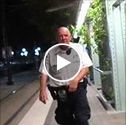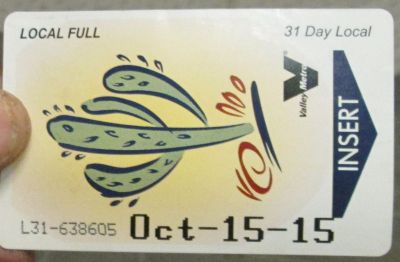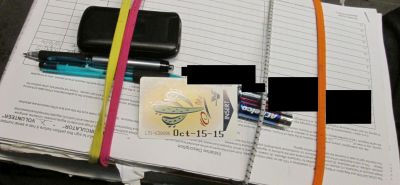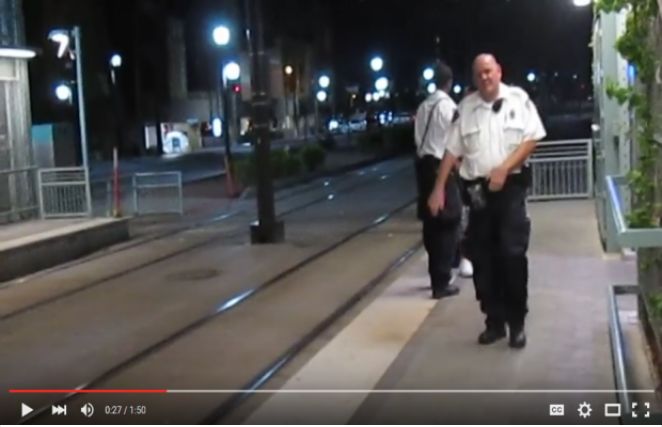 Here is a videotape of he jackbooted Valley Metro pig who tried to stop me from videotaping them in what appeared to be them abusing a man who had passed out with a medical condition at the Tempe Light Rail station on 3rd Street & Mill in Tempe.
Here is a videotape of he jackbooted Valley Metro pig who tried to stop me from videotaping them in what appeared to be them abusing a man who had passed out with a medical condition at the Tempe Light Rail station on 3rd Street & Mill in Tempe.
https://youtu.be/0-NcaK599Fs
Here is a transcript of the conversation between me and the Valley Metro Light Rail cop. Some of the words I didn't quite understand, and some of them I may have missed. But I think the transcript gives a reasonable description of what happened.
| Cop: | Hey, what are you doing? What are you doing? |
| Me: | Video taping |
| Cop: | Why are you videotaping? I ain't doing nothing wrong. |
| Me: | Well then you shouldn't worry about me videotaping you |
| Cop: | You can't videotape me unless I give you permission. You better look up the law. |
| Me: | Ha, ha, ha [me laughing] |
| Cop: | Ha, ha, ha [cop mocking my laughter] |
| Cop: | You gotta pass? |
| Me: | Damn right I got a pass |
| Cop: | You are on private property. You can videotape me to the end of the property. Just keep walking. [ 1) the cop didn't wait for me to pull out my pass and 2) the cop just ordered me off the property with this statement 3) Some of these words I didn't understand and will have to listen to the tape a few more times to get correctly]
[About this time one of the other Valley Metro Light rail cops said I was allowed to video tape them] |
| Me: | Do you have a name? |
| Cop: | Yea, Nunya [Maybe Noneya, or maybe he meant None of ya business] |
| Me: | What's your number or something? |
| Cop: | Sergeant |
| Me: | [I was talking to the other cop who had just said it was OK to videotape] OK, what's this guys name here? He told me I couldn't videotape. |
| Cop: | You need to have a pass. You can't be on my property. |
| Me: | I got a pass |
| Cop: | I asked you, you didn't produce. |
| Me: | That's because you're threatening me for for videotaping. |
Link to the video on YouTube
Here is a link to the video which has been uploaded to YouTube.https://youtu.be/0-NcaK599FsThis is a request for public records. Can you please give me the name of the pig who told me that I don't have no stinking Constitutional rights in Tempe, Arizona or on Valley Metro property and I had to have his stinking permission to video tape him committing crimes?
Again the data will not be used for commercial purposes and I will use it to sue Tempe and Valley Metro in Federal court and to publicize the corrupt Arizona government.
Summary of what happened
On Friday night, October 9, 2015 around 8:00 pm to 8:30 pm as I was going home from collecting signatures to legalize marijuana at the Tempe Town Toilet or Tempe Town Lake this happened to me at the light rail station in Tempe on 3rd Street and Mill Avenue.Had my civil rights violated by the Valley Metro Light Rail Police at the Tempe Mill Avenue & 3rd Street light rail station.
I was video taping two Valley Metro light rail narcs who seem to be roughing up a person who passed out at the light rail station on 3rd & Mill in Tempe.
I suspect the guy who passed out was not drunk, but had a medical condition.
When the guy did get up he wasn't staggering like drunks usually do.
One of the pigs told me I didn't have any Constitutional rights to video tape him and seem to want to take my camera away from me. He told me I could only video tape him if I had his permission.
I had to back away from him and flee because I was afraid he would smash my camera or falsely arrest me.
I will be filing a lawsuit in Federal Court for civil rights violations. I.e., a Title 42, Section 1983 civil rights lawsuit.
Photos of Valley Metro Light Rail Pass
This incident happened on Friday, October 9, 2015. The Valley Metro Pass I had below is a 31 day pass and expired 6 days after the incident occured.The Valley Metro Pass was good from Sept 14, 2015 to October 15, 2015.


After the article I have a link to the video and to a transcript, and my web page on it.
Walter Scott Shooting Highlights Cops’ Contempt for the Right to Record Police
The illegal harassment of camera-carrying bystanders needs to stop.
Jacob Sullum | April 15, 2015
Even before it became clear that Feidin Santana was witnessing what local authorities now describe as a murder, it took guts for him to record the police encounter that ended in Walter Scott's death. Santana, who was walking to work at a barbershop in North Charleston, South Carolina, the day before Easter, risked illegal retaliation by camera-shy cops the moment he stopped talking on his smartphone and started using it to capture Scott's interaction with patrolman Michael Slager.
Although the First Amendment right to record the police as they perform their duties in public is well established, cops often violate that right by ordering people to turn off their cameras, confiscating their cellphones, or arresting them on trumped-up charges. The shooting of Walter Scott, which last week led to Slager's arrest thanks to the details revealed by Santana's video, illustrates both the prevalence of this contempt for constitutional rights and the importance of counteracting it.
After Scott fell to the ground, struck by five of the eight rounds that Slager fired at him as he fled a traffic stop, Santana continued recording. "One of the officers told me to stop," Santana told CNN. "It was because I say to them that what they did, it was an abuse, and I witnessed everything."
The New York Times reports that when Scott's older brother, Anthony, arrived at the crime scene and took pictures of the body, three officers "surrounded him, telling him to turn over his phone." He gave it to them. "Hours later," the Times says, North Charleston Police Chief Eddie Driggers "arrived, returned Mr. Scott's phone and offered his condolences."
As Driggers seemed to recognize, there is no legal basis for such interference with camera-carrying bystanders. The right to record police has been explicitly upheld by at least four federal appeals courts—in the 1st, 7th, 9th, and 11th circuits—and implicitly recognized by others.
Federal judges outside of those four circuits have ruled that the right to record flows logically from the First Amendment right to gather information and that it applies equally to everyone, not just credentialed journalists. Big-city police chiefs take it for granted that "members of the public are legally allowed to record police interactions," as a 2014 NYPD memo put it, and that "a bystander has the same right to take photographs or make recordings as a member of the media," as Washington, D.C., Police Chief Cathy Lanier informed her officers in 2012.
The behavior of North Charleston police after the shooting of Walter Scott suggests why such memos are necessary. So do the actions of the officers who arrested Austin, Texas, activist Antonio Buehler three times in 2012 for daring to record police encounters.
Last July, responding to a lawsuit filed by Buehler, a federal judge ruled that the right he was exercising is well enough established that police cannot rely on qualified immunity to escape liability for violating it. U.S. Magistrate Judge Mark Lane cited "a robust consensus of circuit courts" that "the First Amendment encompasses a right to record public officials as they perform their official duties."
Even the threat of personal liability may not be enough to deter cops from harassing people who record them, since taxpayers typically pick up the tab when cities settle lawsuits arising from such incidents. Last year, for instance, New York City paid $125,000 to settle a lawsuit brought by Brooklyn resident Dick George, who said police roughed him up and arrested him for disorderly conduct after he recorded a stop-and-frisk encounter in 2012.
According to George's complaint, one of the cops said, "Now we are going to give you what you deserve for meddling in our business, and when we finish with you, you can sue the city for $5 million and get rich. We don't care."
Anthony Scott encountered a similar attitude when the cops took his cellphone. "It was eerie how they were acting," he told the Times. "They were cocky."
© Copyright 2015 by Creators Syndicate Inc.
Jacob Sullum is a senior editor at Reason magazine and a nationally syndicated columnist.
Here is a link to that URL:
The illegal harassment of camera-carrying bystanders needs to stop
This article is related to last when when the Valley Metro Cops chased me off the platform for videotaping them on the Tempe Mill Avenue & 3rd Street light rail platform.
Phoenix Security Guard Claims Photography is a Crime on Region’s Train
Nice it looks like someone the media is concerned about when the Valley Metro Light Rail Police told me I couldn't videotape them and then chased me off the platform of the Valley Metro Tempe light rail station in Tempe on 3rd Street and Mill Avenue.
https://photographyisnotacrime.com/2015/10/phoenix-security-guard-claims-photography-is-a-crime-on-regions-train/
Phoenix Security Guard Claims Photography is a Crime on Region’s Train

Douglas Hester
Body Cam, PINAC News, PINAC News Top 3
A passenger waiting for a train at Phoenix Valley Metro’s Mill Avenue and 3rd Street station in Tempe, Arizona was threatened by a private security guard recently for recording that guard and two of his partners attending to another rider who appeared to be ill.
The passenger, who identifies himself as Basil Pebble on YouTube, was at the station at about 8 p.m. on October 9 returning from Tempe Town Lake when he noticed three of Valley Metro’s contracted guards surrounding a man who was apparently having a medical issue.
Pebble, who writes that he believed the man was merely sick and not drunk or impaired, thought the guards might be unnecessarily giving the man a hard time.
So he pulled out his phone and started recording.
After about 25 seconds of Pebble recording video of the interaction, one of the guards noticed and began to approach Pebble, asking “What are you doing?”
Pebble, who from his YouTube account appears to be quite the activist, replied “Videotaping”.
“Why are you videotaping?,” the guard asked. ” I ain’t doing nothing wrong.”
“Well then you shouldn’t worry about me videotaping you,” Pebble said.
The guard then told Pebble “You can’t videotape me unless I give you permission. You better look up the law.”
Pebble laughed at that, and the guard then mockingly laughed back at him.
Pebble was right to be amused because it is actually the guard who needs to look up the law, not Pebble. Valley Metro stations are public property, and the platforms are open to the public at all hours and unrestricted in any way from access by anyone.
Since recording and photography in public is perfectly legal and persons standing on public property have no reasonable expectation of privacy, the guard has no authority to demand that anyone stop recording at a light rail station.
The encounter then took an ugly turn when the guard walked right up to Pebble, forcing him to back up, and asked him if he had a light rail pass.
Pebble answered in the affirmative, although it is unclear why this matters since no ticket is necessary to access the platform and passenger tickets are only checked randomly once they are actually on the train. Regardless, Pebble has posted a picture of his valid monthly pass for October on his website as proof that he was a ticketed passenger that evening.
Once Pebble confirmed he had a ticket the guard informed him, again incorrectly, that Pebble was on private property. The guard then continued walking at Pebble until he stepped off the platform onto the adjacent street. At that point Pebble asked the guard his name and number, to which the guard responded “Nunya” (as in “Nunya business”). Pebble is seen on the tape asking another guard for the first one’s name but none is given.
----
The video ends with Pebble continuing to film the scene from the adjacent public street, as he states on his website that he was afraid that the guard was going to assault him or smash his camera. He writes that he is planning to file a lawsuit against Valley Metro for violating his right to film.
Valley Metro Rail, Inc., was formed as “a nonprofit, public corporation” in 2002 and therefore its stations and stops are indeed public property subject to filming by any interested parties at any time so long as they are not interfering with public safety activities. This would obviously also apply to private security guards contracted by the agency since taxpayer dollars are used to pay them.
Metro does have a policy which covers asking for permission before recording or filming on Metro property but this appears to be geared towards commercial photography (something in which Pebble obviously was not engaged) as it requests insurance information be provided. Interestingly, this filming policy states that “Valley Metro, its employees or agents, must not be presented in a negative manner. In general, filming and photography must not portray public transportation as an unsafe or dangerous environment. Filming must not include scenes that depict the following: suicide, attempted suicide, pushing someone in front of an operating bus or train, violence, or sexually explicit activity or assault on transit property.” It is unclear how that edict would possibly be enforced.
Contact Susan Tierney, Communications Manager, at 602-523-6004 or Ann Glaser, Public Information Specialist, at 602-523-6055.
Ticketed Passengers Only on Station Platform
According to this sign tickets are required to be on the Valley Metro Light Rail platform. The sign is at the Valley Metro Light Rail Station in Tempe at the Tempe Transit Center at 200 E 5th St. The cross streets are College Avenue, 5th Street which was renamed Veterans Way.But sadly our government masters are often habitual liars and often post imaginary or non-existent laws as can be seen on this web page which shows an imaginary law that some jerk in the Phoenix Parks and Recreation Department posts to run homeless people out of Phoenix Parks.
But at the time I was on the platform, which was on October 9, 2015, I had this 31 day pass which was good till October 15, 2015.

